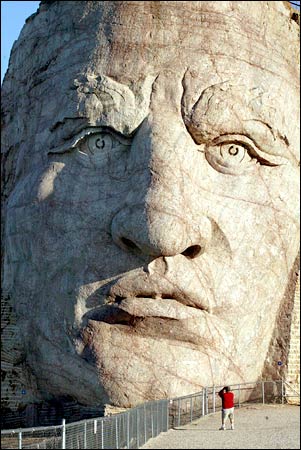I haven't read the book, but I wonder if it reinforces my claim that McMurtry was biased against Indians in Lonesome Dove and Comanche Moon. There are hints that it does.
Crazy Horse: A Life (Penguin Lives Biographies)
By Randy Keehn (Williston, ND United States)
[T]his book goes in some strange directions dealing with this paucity of information. For example, in trying to describe the great gathering of Indians at the Ft. Laramie Council of 1851, McMurtry inexplicably quotes Wilfred Thesiger's account of an Ethiopian gathering of African tribesmen. Shortly thereafter, he describes the tribal warfare of the Sioux by quoting Peter Matthiessen's description of tribal warfare in New Guinea in the early 1960's. Well, the primary resources on Native Americans may be limited but not so much that we must wander to other continents for our facts.
McMurtry unqualified, March 9, 1999
By A Customer
What are McMurtry's qualifications to write about Crazy Horse, one wonders? Does he know the Lakota people? Has he lived among them? Has he heard their oral traditions? Does he have the vaguest idea of what Crazy Horse means to Crazy Horse's people? In general, James Atlas, editor of the Penguin series of short biographies, is on the right track in not seeking academic scholars and similar authorities to write these books, but SOME expertise, one would think, would not be amiss, especially in dealing with a figure so lost in myth as this compelling Oglala. The best book on Crazy Horse is STONE SONG by Win Blevins. It is a novel. McMurtry also writes novels and needs to stick to the form.
A waste of time, September 13, 2000
By A Customer
This book was absolutely pathetic. For anyone seeking any understanding of Crazy Horse, Lakota culture, the history of the American West, look elsewhere. I find it hard to believe that anyone would publish such a flimsy and insubstantial piece of writing. This book contributes absolutely nothing to our understanding of Native Americans or of our history. What an insult to the intelligence of any reader.
"Crazy Horse"
These quotes suggest McMurtry's Eurocentric bias. Indians used to be brave, noble savages in some distant, romantic past. But by the time the Americans confronted them, they were broken, pitiful remnants of their former glorious selves. They were on their way to dying out despite the efforts of a few valiant exceptions such as Crazy Horse.
Crazy Horse and Winnetou
This is exactly the attitude Europeans take about their beloved Winnetou in Karl May's Old Shatterhand books. Namely, that Winnetou was a brave, noble savage among the corrupt and degraded bands of skulking Indians. One European has even argued that these portraits of a noble savage means the books were pro-Indian.
Wrong, I told him. Look at the corrupt and degraded bands of skulking Indians, not at the single noble savage. These "broken" Indians are the norm in May's (and McMurtry's) books. They determine whether the author was pro- or anti-Indian.
For more on the subject, see The Best Indian Books.


No comments:
Post a Comment
Note: Only a member of this blog may post a comment.